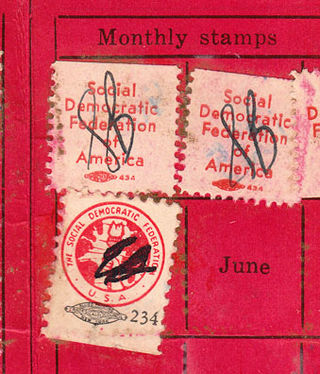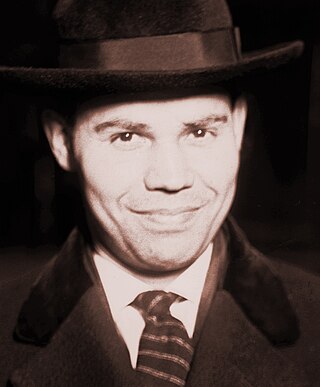
The Socialist Party of America (SPA) was a socialist political party in the United States formed in 1901 by a merger between the three-year-old Social Democratic Party of America and disaffected elements of the Socialist Labor Party of America who had split from the main organization in 1899.

The Social Democratic Federation of the United States of America(SDF) was a political party in the United States, formed in 1936 by the so-called "Old Guard" faction of the Socialist Party of America. The SDF later merged again with the Socialist Party in 1957 to form the Socialist Party-Social Democratic Federation (SP-SDF).
The history of the socialist movement in the United States spans a variety of tendencies, including anarchists, communists, democratic socialists, Marxists, Marxist–Leninists, Trotskyists and utopian socialists. It began with utopian communities in the early 19th century such as the Shakers, the activist visionary Josiah Warren and intentional communities inspired by Charles Fourier. Labor activists, usually Jewish, German, or Finnish immigrants, founded the Socialist Labor Party of America in 1877. The Socialist Party of America was established in 1901. By that time, anarchism also rose to prominence around the country. Socialists of different tendencies were involved in early American labor organizations and struggles. These reached a high point in the Haymarket massacre in Chicago, which founded the International Workers' Day as the main labour holiday around the world, Labor Day and making the eight-hour day a worldwide objective by workers organizations and socialist parties worldwide.
The International Revolutionary Marxist Centre was an international association of left-socialist parties. The member-parties rejected both mainstream social democracy and the Third International.

Louis Waldman was a leading figure in the Socialist Party of America from the late 1910s and through the middle 1930s, a founding member of the Social Democratic Federation, and a prominent New York labor lawyer. He was expelled from the New York State Assembly in 1920 during the First Red Scare.

August Tyler (1911-2011) was an American socialist activist of the 1930s, a labor union official, author, and newspaper columnist. Tyler is best remembered as a leading American labor intellectual of the post-World War II era and as the author of a history of the International Ladies Garment Workers Union.

Socialism in Canada has a long history and along with conservatism and liberalism is a political force in Canada.

James J. Oneal, a founding member of the Socialist Party of America (SPA), was a prominent socialist journalist, historian, and party activist who played a decisive role in the bitter party splits of 1919–21 and 1934–36.
The Committee for the Preservation of the Socialist Party was a short-lived organized factional grouping in the Socialist Party of America established in 1934 by its New York–based "Old Guard" faction. The Committee was initially organized to fight for the defeat of the Declaration of Principles adopted by the 1934 National Convention in the referendum for its ratification taken by mail vote of party members. After the Declaration of Principles was passed, the Committee served as the organizational core of the Social Democratic Federation of America, a rival social democratic organization to the Socialist Party established in 1936.

Clarence Ollson Senior (1903–1974) was an American socialist political activist best remembered as the National Executive Secretary of the Socialist Party of America during the 1930s. Originally a protégé of presidential candidate Norman Thomas, during the inner-party fight of the 1930s, Senior became an active supporter of the so-called "Militant" faction. After resigning his post late in 1936, Senior returned to graduate school, becoming a widely published academic specializing on the affairs of Puerto Rico and other nations of the Caribbean.

The Militant faction was an organized grouping of Marxists in the Socialist Party of America (SPA) who sought to steer that organization from its orientation towards electoral politics and towards direct action and revolutionary socialism. The faction emerged during 1930 and 1931 and achieved practical control of the organization in 1934. The existence of the "Militants" and the threat they represented to the political line of the SPA caused traditional electorally oriented members to form an organized grouping of their own, known as the "Old Guard faction." In 1935 the personal and political friction between these two basic tendencies lead to an organizational split, with the Old Guard faction leaving to establish the Social Democratic Federation (SDF). The Militant faction itself shattered in the aftermath of the 1935 party split with only a small core loyal to perennial Presidential candidate Norman Thomas remaining in the organization by the coming of World War II.
Haim Kantorovitch was an American socialist teacher, writer, and Marxist theoretician. Kantorovitch is best remembered as one of the intellectual leaders of the Militant faction of the Socialist Party of America in the early 1930s and as a founder and editor of The American Socialist Quarterly, the SP's theoretical magazine.

For a number of decades after its establishment in August 1901, the Socialist Party of America produced or inspired a vast array of newspapers and magazines in an array different languages. This list of the Non-English press of the Socialist Party of America provides basic information on each title, along with links to pages dealing with specific publications in greater depth.
The American Left can refer to multiple concepts. It is sometimes used as a shorthand for groups aligned with the Democratic Party. At other times, it refers to groups that have sought egalitarian changes in the economic, political, and cultural institutions of the United States. Various subgroups with a national scope are active. Liberals and progressives believe that equality can be accommodated into existing capitalist structures, but they differ in their criticism of capitalism and on the extent of reform and the welfare state. Anarchists, communists, and socialists with international imperatives are also present within this macro-movement. Many communes and egalitarian communities have existed in the United States as a sub-category of the broader intentional community movement, some of which were based on utopian socialist ideals. The left has been involved in both the Democratic and Republican parties at different times, having originated in the Democratic-Republican Party as opposed to the Federalist Party.
The Workers Party (WP) was a Third Camp Trotskyist group in the United States. It was founded in April 1940 by members of the Socialist Workers Party who opposed the Soviet invasion of Finland and Leon Trotsky's belief that the USSR under Joseph Stalin was still innately proletarian, a "degenerated workers' state." They included Max Shachtman, who became the new group's leader, Hal Draper, C. L. R. James, Raya Dunayevskaya, Martin Abern, Joseph Carter, Julius Jacobson, Phyllis Jacobson, Albert Glotzer, Stan Weir, B. J. Widick, James Robertson, and Irving Howe. The party's politics are often referred to as "Shachtmanite."
Socialist Appeal was a newspaper published by American Trotskyists from 1935 to 1941. It was founded by supporters of the Trotskyist Workers Party of the United States in Chicago who had practiced entryism of the Socialist Party of America in 1935. It was edited by Albert Goldman. In 1936, the Workers Party formally dissolved and entered en masse into the SPA. In August 1937 the publication moved to New York City and was re-launched as the organ of the "Left Wing Branches of the Socialist Party" but was effectively controlled by the unofficial Trotskyist faction within the SPA. The "Socialist Appeal tendency" split from the Socialist Party to form the Socialist Workers Party in 1938. The publication became the official organ of the SWP and continued as Socialist Appeal until 1941, when it was retitled The Militant, reverting to the name of the original (1928–1934) Communist League of America publication.
Impossibilism is a Marxist theory that stresses the limited value of political, economic, and social reforms under capitalism. As a doctrine, impossibilism views the pursuit of such reforms as counterproductive to the goal of achieving socialism as they stabilize, and therefore strengthen, support for capitalism. Impossibilism holds that reforms to capitalism are irrelevant or outright counter-productive to the goal of achieving socialism and should not be a major focus of socialist politics.
The Revolutionary Policy Committee (RPC) was an offshoot of the so-called "Militant" faction in the Socialist Party of America during the middle-1930s. The group sought to transform the SP into a revolutionary socialist organization from its origins as a social democratic political party.

James Patrick Cannon was an American Trotskyist and a leader of the Socialist Workers Party.

The Socialist Workers Party (SWP) is a Trotskyist communist party in the United States. The SWP began as a group that was expelled from the Communist Party USA for supporting Leon Trotsky over Soviet leader Joseph Stalin.